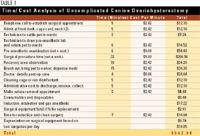Let's get realistic with surgical fees
How much of your income is due to your performing surgery? Perhaps 15 percent? Even 20 percent?
How much of your income is due to your performing surgery? Perhaps 15 percent? Even 20 percent?
I often thank the celestial powers, hedging my bet by including Zeus, Thor, Apollo and Anubis, that my major thrust in practice was medical, not surgical.
This was not because I did not love surgery. I did more than my share of pulmonary lobectomies, secondary to alligator bites and an occasional puppy patent ductus. Those are memorable surgeries, but I must say that, in 30 years, I must have gonadectomized some 10,000 or 12,000 beasts. In fact, if all those excised organs were piled in one heap, I could have climbed to the moon. It would have been as slippery as transfat-free margarine, but I could have done it.
I have found over the years that the inverse-perverse rule applies to all veterinary surgical procedures:
The more complex a surgical procedure, and the more sophisticated the instrumentation needed to arrive at a successful conclusion, the less likely we are to be paid for our devotion, concern and perspiration.
Too often we lose sight of the fact that too much surgery can be fatal to our practice profits. Surgical costs are no exception to the need to recover all our costs, along with a fair profit, to maintain our bottom line.
The leading cause of surgical economic malfeasance is a concept that I have labeled "Snook-Hookitis," whereby all surgeries become regarded and charged for like an ovariohysterectomy with options.
In 1972, Dr. Charles Lippincott, in Veterinary Clinics of North America, determined the cost of an ovariohysterctomy at that time to be about $24.59 and that, to return a profit of 50 percent, should be billed to the pet owner at $50.
Thirty years later, in some parts of the country, you can have a pet spayed for the same $50. This despite the fact that any Internet inflation calculator would tell you that $50 in 1972 would be $242 in 2006.
Let's look at the details in Table 1:

Table 1: Time/Cost Analysis of Uncomplicated Canine Ovariohysterectomy
Using 2006 assumptions, we can update our true-cost analysis for an uncomplicated ovariohysterectomy.
A surgeon with a decade of experience is likely to be paid at least $80,000 and have about $20,000 in benefits. Working 40 hours a week, 50 percent of which would be non-billable, his cost to the hospital would be about $100 per hour. He or she receives percentage compensation at 25 percent of billings, which makes his/her time billable at $400/hour or $6.66 per minute.
Surgical assistants are paid an average of $14.50 per hour and their time also is only 50 percent billable, which makes their $14.50 per hour double to $29 and, as we must keep our staff cost below 20 percent, we must multiply by 5.0 to get $145/hour or $2.42 per minute.
The same is true for our receptionist as she gets involved in our reality series.
Now look at the table I prepared for you on the previous page.
Is the table complete? No!
I gave up in despair. We can never recoup our costs in today's "spay is a commodity" circus.
Did I not include the prorated hospital fixed expenses? Yes!
Of course, the expenses would be less with a $60,000 new graduate and a near-minimum-wage assistant, but is that the direction we want to go? Is that the direction in which we are heading? Yes, if the newly announced managed care for pets featured in the latest Journal of the American Veterinary Medical Association has its way.
Like global warming, our profession can look forward to some hot and hard times ahead unless our collective self-esteem takes a major turn upward.
Just as we eat an elephant one bite at a time, it will be one colleague at a time that finally says, "The heck with it. I'm worth more than this! And – surprise! – clients will pay for good medicine when served with great service.

Gerald Snyder VMD
Dr. Snyder, a well-known consultant, publishes Veterinary Productivity, a newsletter for practice productivity. He can be reached at 10737 Knight Castle Drive, Charlotte NC 28277; (800) 292-7995; vethelp@insightbb.com Fax: (859) 908-6986.